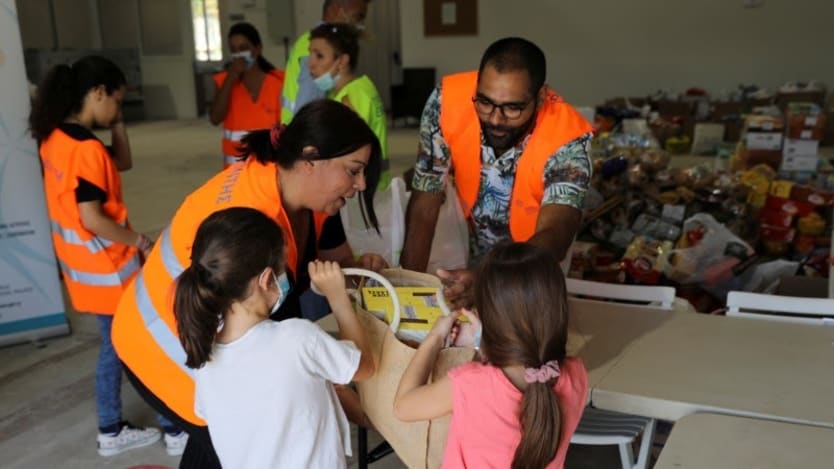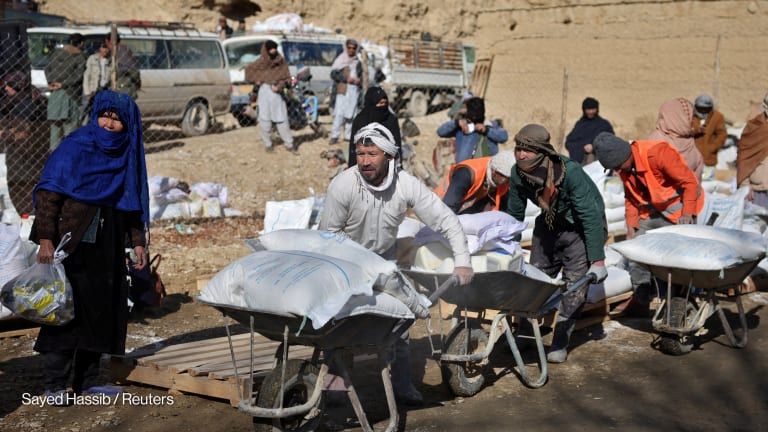
NEW YORK — The explosion in Beirut last week has amplified another, relatively new crisis in Lebanon: rapidly rising rates of food insecurity.
Up until recently, Lebanon had been recognized by humanitarian organizations for hosting Syrian refugees. Now, the World Food Programme estimates that the upper-middle-income country will run out of bread within 2 1/2 weeks, marking “a very short time frame” for humanitarian response, said WFP spokesperson Shada Moghraby.
“In Lebanon, there has been a very fast-deteriorating crisis ever since the last year or so. It was never part of the hot spots that we were concerned about. It just quickly jumped into those areas we are more concerned about within the past year or so,” Moghraby said.
In Beirut, humanitarian responders confront layers of disaster
Following the deadly explosion in Beirut last week, aid workers jump to respond in a context complicated by preexisting economic instability, rising levels of food insecurity, and the COVID-19 pandemic.
“It is a disaster to run out of bread in 2 1/2 weeks. It is a major source of concern. We are urgently importing one month's supply of wheat and grains into the country,” Moghraby continued.
The detonation of more than 2,750 metric tons of ammonium nitrate at the Beirut port on Aug. 4 killed more than 200 people, left nearly 300,000 homeless, and destroyed about 120,000 metric tons of the country’s staple food stocks, including wheat, soy, and beans, according to WFP.
Lebanon imports nearly 85% of its food, and the bulk of the items flowed through the now-destroyed Beirut port. WFP is supporting reconstruction work at the port, which could be partially operating within a few weeks, according to Moghraby.
Before the explosion, WFP found that 50% of surveyed Lebanese people were concerned about not having enough to eat.
“This is a complex situation that has been brewing for a while. It has been going from bad to worse, and now with the explosion, it has definitely compounded the very serious food security situation in Lebanon,” Moghraby said.
WFP Executive Director David Beasley announced Wednesday that the organization is bringing in 17,500 metric tons of wheat flour and a three-month supply of wheat to help replenish the country’s food reserves. The rapid logistics operation will also involve setting up warehouses and mobile grain storage facilities.
The price of a small baguette in Beirut can fluctuate wildly throughout a single week, rising more than 200% within days, according to Caroline Duconseille, head of the Lebanon country office for Humanity & Inclusion. Lebanon’s jump in food prices before the explosion was already the highest in the Middle East and North Africa region over the last several months, as a result of the country’s falling currency rate, according to the World Bank.
“It really is a calamity of unproportional magnitude.”
— Shada Moghraby, spokesperson, WFPMass food aid distribution is visible on the streets of Beirut, according to Duconseille, who noted that some people are traveling from across the country to receive the food distributions intended for those who were impacted by the explosion. But she said that the need is greater for direct cash assistance.
“This is the feeling we have — that the economic situation will worsen very quickly. We are very worried about the economic situation. If you are going on the street, you can find people who do not have doors on their houses anymore, or windows, and say that they need a door to close their house because of security, but they are not able to buy it,” Duconseille said.
WFP is scaling up its existing cash assistance program in Lebanon, which currently reaches more than 100,000 Lebanese, to now provide more than 1 million people with cash aid.
An aid conference for Lebanon last week, co-hosted by the United Nations and France, also brought in €250 million ($290 million) — as well as civil society calls for swift disbursements and structural reform to prevent corruption.
“It really is a calamity of unproportional magnitude. We are trying to work on different fronts to make sure we can minimize the impacts of this as much as we possibly can,” Moghraby said.
Update, Sept. 21, 2020: This article has been updated to clarify that the head of mission in Lebanon for Humanity & Inclusion is Caroline Duconseille.
Search for articles
Most Read
- 1
- 2
- 3
- 4
- 5








